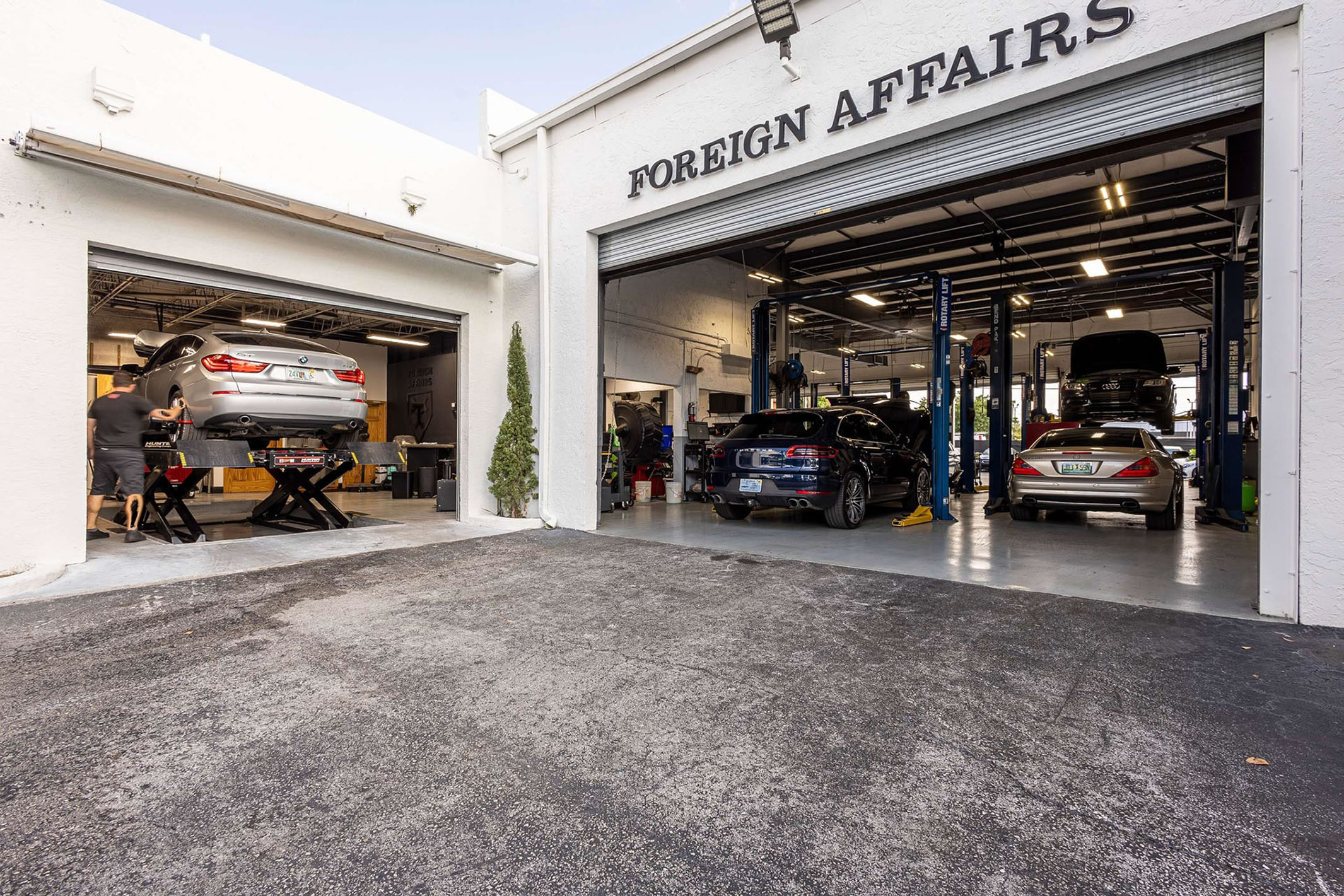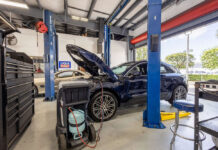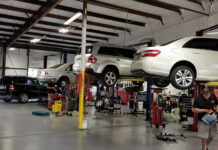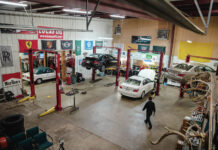Are you searching for European auto repair near me? If so, you’re not alone! Many car owners with luxury brands like BMW, Audi, and Mercedes-Benz often find themselves in need of specialized services. Did you know that not all mechanics are equipped to handle European car repairs? This can lead to costly mistakes and frustrating experiences. That’s why knowing where to find a reliable European auto repair shop is crucial for maintaining your vehicle’s performance and longevity. Wondering how to choose the best mechanic who understands the intricacies of your European car? Or perhaps you’re curious about the latest trends in European car maintenance? By exploring your local options, you can discover not only convenient services but also expert technicians who are trained in the latest automotive technologies. With the right knowledge, you can ensure your vehicle receives the quality care it deserves. So, are you ready to dive into the world of European auto repair and find a trusted service provider near you? Stay tuned as we uncover the secrets to keeping your luxury vehicle in top-notch condition!
Top 5 Signs You Need European Auto Repair: Don’t Ignore These Warning Indicators!
So you’re driving your fancy European car around, and all of a sudden, it starts making that weird noise. You know the one, right? It’s like a cough, but for your vehicle. Now, you’re sitting there thinking, “I need European auto repair near me.” But, like, where do you even start? Not really sure why this matters, but finding a good shop is like finding a needle in a haystack, right?
First things first, let’s talk about what you should be looking for. A lot of folks think all auto shops are the same, but that’s like thinking all pizza is the same. No way, man. You want someone who actually knows their stuff about European cars. These babies are different. They got quirks, and if you take ‘em to just any ol’ mechanic, you might end up with more problems than you started with.
Here’s a little list of what to look for:
- Certifications: Make sure the shop has qualified technicians. ASE certifications is a good start.
- Reviews: Check out Yelp or Google. If they have a ton of one-star reviews, run for the hills!
- Experience: Ideally, you want a shop that’s been around for a while. Newbies? Nah, pass.
Oh, and speaking of reviews, have you ever thought about how some people just love to complain? Like, I read one review that said, “They charged me an arm and a leg.” What does that even mean? Are you supposed to pay in limbs now? Maybe it’s just me, but I feel like some people just want to share their drama.
Now, if you’re looking for European auto repair near me, you might wanna check out some local online directories. Here’s a quick rundown of some popular platforms:
| Platform | What It’s Good For |
|---|---|
| Yelp | Customer reviews and ratings |
| Google Maps | Finding shops close to you |
| Angie’s List | Trusted recommendations |
| Local community opinions |
So, let’s say you found a place that looks decent. You wanna call ’em up and ask some questions. Here’s some stuff you might wanna ask:
- What’s your experience with my car brand?
- Do you use original parts, or are we going for the budget-friendly ones?
- What’s the typical turnaround time for repairs?
If they start stuttering or sound unsure, maybe it’s time to hang up and keep searching. You don’t want someone who’s gonna take forever and a day to fix your ride.
Now, here’s a fun fact: Did you know that certain European cars need specialized tools? Yep, not just any wrench will do the trick. So when you’re out there searching for European auto repair near me, make sure they’ve got the right equipment. Because if they whip out a hammer and duct tape, you might wanna get outta there fast!
Oh, and if you’re really in a pinch, don’t forget about mobile mechanics. They can come to you, which is kinda cool, but also a little sketchy, right? Like, how do they even know what’s wrong without poking around? Just make sure they have a solid reputation before you let ‘em loose on your baby.
And for you DIY folks, there’s a whole world of resources online. YouTube is packed with videos, and forums are buzzing with car enthusiasts who are more than happy to share their wisdom. But, be careful. Sometimes, the advice you get is from a dude who just learned to change his oil last week. Not exactly a master mechanic, huh?
In case you didn’t know, some places specialize in certain European brands, like BMW or Audi. If you’ve got a specific car, maybe look for a niche shop. They might know a thing or two that general mechanics don’t.
Here’s an example of a quick comparison I found online about costs:
| Service | General Shop Price | European Specialist Price |
|---|---|---|
| Oil Change | $40 – $70 | $70 – $120 |
| Brake Replacement | $150 – $300 | $250 – $500 |
| Transmission Repair | $1,000 – $2,500 | $1,500 – $3,500 |
The price differences are wild, huh? But sometimes you gotta pay for the expertise. Like they say, you get what you pay for!
So, next time you’re cruising around and your car starts acting funny, just remember all these tips. You don’t have to settle for just any shop. Finding that perfect European auto repair near me can feel like a treasure hunt, but with a bit of patience and the right questions
How to Choose the Best European Auto Repair Shop Near You: A Complete Guide
So, you’re on the hunt for european auto repair near me, huh? It can be a real pain in the neck trying to find a trustworthy shop, especially with all those fancy car brands and their, like, intricate systems. You know what I mean? I mean, who really wants to get ripped off or end up with a mechanic who doesn’t even know how to say “Volkswagen” right? It’s a jungle out there, folks.
First, let’s talk about what you should look for when searching for european auto repair near me. You gotta think about experience, right? If the guy fixing your BMW has only worked on lawnmowers before, maybe it’s time to reconsider. I dunno, maybe it’s just me but I feel like a good mechanic should at least know the basics of the car they’re working on. You don’t want your engine to sound like a blender, do ya?
Next up, reviews. Oh boy, the reviews! It’s almost like a double-edged sword. You got the five-star reviews that make you think, “Wow, this place must be heaven on earth!” but then you read the one-star ones and it’s like, “Did I just step into a horror movie?” Look for patterns. If everyone’s saying the same thing, like, “They replaced my transmission and it’s still broken,” you might wanna steer clear.
Now, let’s get a little practical. You could make a list of potential shops and see what they specialize in. Here’s a little table I whipped up to help you out. Trust me, it’s super helpful.
| Shop Name | Specialization | Customer Rating | Distance from You |
|---|---|---|---|
| Euro Car Repair | BMW, Audi, Mercedes | 4.5/5 | 5 miles |
| Classic European Auto | VW, Porsche | 4.2/5 | 10 miles |
| Prestige Auto Works | All European Brands | 4.8/5 | 3 miles |
You see what I did there? Kinda makes it easy to compare, right? Maybe you’re thinking, “But what about the price?” Well, that’s a whole can of worms. European cars can be pricey to fix, mainly because they require, like, special parts and all that jazz. But if you find a shop that’s fair and doesn’t charge you an arm and a leg, that’s a win in my book.
Also, don’t be shy about asking questions. A good mechanic will be more than happy to explain what’s wrong with your car, even if you don’t understand half of what they’re saying. And if they give you that look like you’re asking them to solve a Rubik’s Cube blindfolded, maybe it’s time to walk away. Just saying.
So, you’re probably wondering where to even start searching for european auto repair near me. It’s like a treasure hunt, really. You can start with Google, of course, but don’t forget about Yelp or even Facebook. Sometimes local groups have the best recommendations, even if they come with a side of drama. You know how it is.
And if you’re still not sure, go ahead and ask your buddies. Someone always knows a guy, right? Maybe your friend’s uncle’s neighbor fixes cars on the side and does a pretty good job. It’s a small world, and sometimes, the best finds are just a conversation away.
Here’s a quick list of things to ask when you finally find a shop:
- What’s your experience with European models?
- Do you offer warranties on your repairs?
- Can you provide a detailed estimate before starting?
- What parts do you use, and are they OEM or aftermarket?
- How long will the repairs take?
You might think that’s a lot of questions, but hey, it’s your car. You don’t wanna be left in the lurch because you were too shy to ask the right stuff. Speaking of questions, I wonder if you’ve ever heard the saying, “If you don’t ask, you won’t know.” It’s true!
At the end of the day, finding european auto repair near me doesn’t have to be a stressful experience. Sure, it might take a little effort, but it’s totally worth it to have peace of mind knowing your car is in the hands of someone who actually knows their stuff. And who knows, maybe you’ll even make a friend in the process. You never know where a little grease and a few car parts might lead you!
Unlocking the Secrets: Why Specialized European Auto Repair is Worth the Investment
If you ever find yourself in a pickle with your European car, you might be thinking, “Where can I find european auto repair near me?” I mean, it’s not like you can just throw a dart at a map and hope for the best, right? So, let’s dive into some stuff you probably didn’t know about finding the right repair shop for your beloved European ride.
First off, why do you even need a specialist for your European vehicle? You might be thinking, “A car is a car, right?” Well, not really. European cars, like BMWs, Audis, and even Fiats, they often have specific parts and technology that your average Joe mechanic might not understand. It’s like asking a cat to do your taxes — just ain’t gonna work out, folks. So, it’s better to go for that european auto repair near me that knows what they’re doing.
Here’s a quick list of some popular European vehicles and their common issues:
| Vehicle | Common Problems | Recommended Repair Shop |
|---|---|---|
| BMW | Electrical issues, coolant leaks | Bimmer Buddy Auto Repair |
| Audi | Oil consumption, transmission issues | Audi Masters Garage |
| Volkswagen | Timing belt failure, brake issues | VW Specialists Inc. |
| Mercedes-Benz | Suspension problems, A/C issues | Benz Pros Automotive |
| Fiat | Electrical glitches, engine issues | Fiat Fix It Garage |
Now, not to be a downer or anything, but finding the right shop could take a bit of detective work. You can’t just Google european auto repair near me and pick the first one that pops up, right? I mean, sure, you could, but then you might end up with someone who thinks a screwdriver is the answer to all problems. Not really sure why this matters, but trust me, it does.
One thing you gotta look for is certifications, like ASE (Automotive Service Excellence). Why? Well, these guys know their stuff. If a shop has a bunch of shiny certifications hanging on the wall, it’s usually a good sign. But again, maybe it’s just me, but I feel like some people hang diplomas just to impress customers. So take it with a grain of salt.
Another tip? Ask around! Friends, family, or that random guy at the coffee shop — anyone might have some solid recommendations. You’d be surprised how much gossip travels through small talk. Just make sure you’re not asking someone who thinks changing the oil means pouring it down the drain.
Oh! And don’t forget to check online reviews! Y’know, those things where people rant about how they got ripped off or how their car came back cleaner than it was before? Yeah, those. Sites like Yelp or Google can be a goldmine for figuring out if a shop is worth your time. Just watch out for the overly positive reviews — like, did they pay for those? You never know.
Here’s a few questions to ask when you finally find a potential shop:
- What’s your experience with my car brand?
- Do you use OEM (Original Equipment Manufacturer) parts?
- How long will the repairs take?
- Can you provide a detailed estimate?
You might think asking these questions is a bit much, but hey, better safe than sorry, right? Plus, it shows that you care about your car, even if it’s just a hunk of metal to some folks.
And let’s not forget about prices! Some shops might charge an arm and a leg, while others might be more reasonable. It’s like shopping for shoes, you know? You don’t want to break the bank, but you also don’t want to buy something that’ll fall apart in a week. So, be on the lookout for those hidden fees that might come up.
Here’s a handy-dandy table comparing prices for common repairs:
| Repair Type | Average Cost (USD) | European Specialist Cost (USD) |
|---|---|---|
| Oil Change | 30-70 | 80-120 |
| Brake Pad Replacement | 150-300 | 250-400 |
| Transmission Service | 150-250 | 300-500 |
| Timing Belt Change | 500-900 | 800-1200 |
Crazy, right? It’s like the difference between buying a sandwich at a food truck versus a fancy restaurant.
Lastly, keep an eye out for warranties. If a shop offers a warranty on their work, that’s usually a good sign. It means they’re confident about what they’re doing. If they don’t, well, maybe you should be worried.
So there you have it, a somewhat messy guide to
Expert Tips for Maintaining Your European Vehicle: Prolong Its Life with Simple Steps
So, you’re on the hunt for European auto repair near me? Well, join the club! It’s like searching for a needle in a haystack sometimes, isn’t it? And not just any needle, but like a fancy gold-plated needle that costs a fortune. But seriously, if you own a European car, you probably know the struggle of finding a good mechanic who doesn’t charge you an arm and a leg. Maybe it’s just me, but I feel like you gotta really search hard to find someone who can actually fix the problem without creating two new problems.
First off, let’s chat about what makes European auto repair near me so special. You know, we’re talking about brands like BMW, Mercedes-Benz, Audi, and all those other fancy names that make your car feel like a VIP at a nightclub. But, here’s the kicker: these cars often need specialized attention, and not just any ol’ shop can do the trick. It’s like expecting a fast-food joint to whip up a gourmet meal—good luck with that!
Now, if you’re like most folks, you probably start with a quick Google search. You type in European auto repair near me, and BAM! You’re hit with a list that’s longer than your grocery list after a week of eating in. But don’t just pick the first one that pops up, oh no! You gotta do your homework. Check reviews, talk to friends, or even better, ask random people at the coffee shop. I mean, who doesn’t love unsolicited car advice, right?
Here’s a little table to help you navigate the process of finding the right shop.
| Step | Action | Notes |
|---|---|---|
| 1 | Search for European auto repair near me | Use Google, Yelp, or ask around. |
| 2 | Read reviews | Pay attention to comments about customer service and expertise. |
| 3 | Visit the shop | Check out the cleanliness and vibe of the place. If it’s a mess, run! |
| 4 | Ask questions | Don’t be shy! A good mechanic should be able to explain things in layman’s terms. |
| 5 | Get a quote | Make sure you understand what you’re paying for. |
Now, you might think that all European auto repair near me places are created equal, but oh honey, that couldn’t be further from the truth. Some shops are like Michelin-star restaurants, while others are more like that questionable diner on the corner. You know, the one with the flickering neon sign? Yeah, avoid those.
When you finally find a shop you think might work, here’s some practical insight: don’t be afraid to ask for a consultation. Most places will give you an idea of what’s wrong without charging you right off the bat. But, just a heads-up, if they start talking in jargon that sounds like a foreign language, maybe it’s time to find a new mechanic. Like, I’m not really sure why this matters, but if they can’t explain it simply, do ya really want them working on your car?
And let’s not forget about pricing! If you think you can just waltz in and get a good deal on your European auto repair near me, think again. These shops know what they’re doing, and they know those car parts are not cheap. So, don’t be surprised if you get a quote that makes you gasp. It’s all part of the game. But if you feel like they’re just pulling numbers out of a hat, well, trust your gut and keep lookin’.
Here’s a list of some common services you might need for your European ride:
- Oil Changes: Regular oil changes are essential, especially for turbocharged engines.
- Brake Work: Don’t ignore those squeaky brakes! Get them checked before it’s too late.
- Transmission Services: They can be pricey, but a good mechanic can save you tons in the long run.
- Electrical Work: European cars have advanced electrical systems that often require special tools.
And, if you’re still not sure what to do, consider joining local social media groups. You’ll find tons of people droppin’ recommendations for European auto repair near me. Just remember to take everything with a grain of salt. Not everyone’s advice is gold, and sometimes, it’s just someone who thinks they know it all—even if they’ve never owned a car!
Lastly, if you’re in a bind, some shops offer loaner cars or shuttle services while your car gets fixed. This can be a lifesaver, especially if you rely on your ride for daily commutes.
So, there you go! The world of European auto repair near me is a wild ride, but with a little patience and some elbow grease (or, you
European Auto Repair Near Me: Compare Prices and Services for Your Vehicle
When your European car starts makin’ weird noises or, I dunno, just doesn’t run like it used too, you might find yourself googling european auto repair near me. And, lemme tell ya, it can be a bit of a wild goose chase. I mean, it’s like finding a needle in a haystack, right? But don’t fret, I’m here to help you navigate this maze of mechanics and repairs.
First things first, why do we even need a specialized auto repair for European cars? Well, these cars are built differently, and they all come with their own quirks and charms. If you don’t have someone who knows their way around a BMW or a Volkswagen, you might be in for more trouble than it’s worth. Not really sure why this matters, but let’s just say you don’t wanna go to a place that thinks a Porsche is just a fancy Volkswagen.
So, how do you go about finding the right place? Here’s a little bit of a guide:
- Check Online Reviews: You can’t go wrong with a good ol’ internet search. Look up european auto repair near me and see what pops up. Yelp, Google, Facebook – they’re all great for finding out what others think. Just remember, people are quick to complain but slow to praise. So, take those reviews with a grain of salt. Is it just me, or do people love to write about their bad experiences more than good ones?
- Ask Friends and Family: Seriously, word of mouth is powerful. If someone you know has a European car, ask ‘em where they go for repairs. Maybe you’ll find out that one hidden gem that no one’s talking about online. I mean, maybe it’s just me, but I find personal recommendations are usually way more reliable than random online reviews.
- Look for Certifications: When you find a shop, check if they have certifications for European auto repairs. They should be familiar with brands like Audi, BMW, or Mercedes-Benz, and there’s a good chance they have some kinda certification that proves they know their stuff. It’s like a badge of honor in the mechanic world.
- Get an Estimate: Don’t be shy! Ask for an estimate before you commit to anything. Most shops will give you a breakdown of what’s gonna cost. If they don’t, maybe run for the hills. You don’t wanna be surprised with a bill that looks like your mortgage payment.
- Visit the Shop: If you can, swing by the shop. Look around. Is it messy? Are the mechanics busy? A cluttered shop can sometimes mean they’re too busy to care about your car. And I don’t know about you, but I want my car to be treated like a queen, not a forgotten toy in the corner.
Speaking of which, here’s a handy little table to help ya keep track of things you should ask when you’re searching for european auto repair near me:
| Question | What to Look For |
|---|---|
| Do they have experience with my car brand? | Yes, specifically with your model. |
| How long have they been in business? | More years usually means more experience. |
| Are the parts they use OEM or aftermarket? | OEM is better, usually. |
| What’s their warranty on repairs? | Look for at least a year or more. |
| Do they offer a shuttle service? | Super convenient if you need to drop off your car. |
Now, let’s not forget about the costs. European auto repair can be a bit pricier than your average Joe mechanic. But hey, you get what you pay for, right? Here’s a rough breakdown of common repairs and how much they might set ya back:
- Oil Change: $100 – $200
- Brake Pads Replacement: $300 – $800
- Transmission Repair: $1,200 – $3,000
- Timing Belt Replacement: $500 – $1,500
Yeah, I know, it’s a bit shocking. But if you’re driving a luxury vehicle, you gotta expect luxury prices. Just think of it as an investment in your car’s future. Or, ya know, a way of keeping it from turning into a rust bucket.
One last thing, if you find a shop you like, stick with them! Building a relationship with your mechanic can save you a lot of headaches down the road. They’ll get to know your car and its quirks, and you might even get some discounts if you’re a regular.
So, the next time your European car needs a little TLC, don’t just Google european auto repair near me and hope for the best. Do your homework, ask around, and make sure you
Conclusion
In conclusion, finding reliable European auto repair services near you is essential for maintaining the performance and longevity of your luxury vehicle. We discussed the importance of seeking specialized technicians who understand the intricacies of European makes and models, ensuring that your car receives the proper care it deserves. Additionally, the value of customer reviews and recommendations cannot be overstated, as they provide insights into the quality of service and expertise available in your area. Remember to consider factors such as warranty coverage, diagnostic equipment, and parts availability when making your choice. By prioritizing these elements, you can confidently select a service center that meets your needs. Don’t wait for your vehicle to show signs of trouble—take proactive steps today to ensure your European car remains in peak condition. Reach out to a local auto repair shop to schedule an appointment and experience top-notch service tailored to your vehicle’s requirements.








